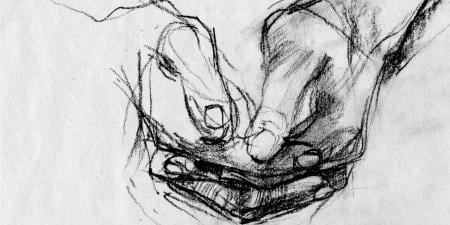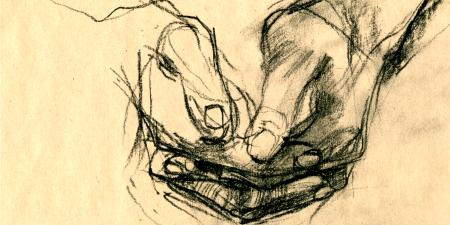Case
Mrs. Jones is an 82-year-old nursing home resident with a longstanding history of heart failure, who is now hospitalized in the cardiac ICU for the third time this year. She is a retired teacher, with 4 children and 8 grandchildren. She did not list a religious preference when admitted to the hospital. The attending cardiologist, Dr. Rosenberg, is a heart failure specialist, and is an active member of an Orthodox Jewish congregation.
On day 3 of her hospitalization, Mrs. Jones developed a fever, which was subsequently determined to be caused by a MRSA line infection from a venous catheter. On day 4, her renal function began steadily deteriorating, until her serum potassium reached dangerous levels.
She has been unconscious for 2 days, and, according to hospital records and her children, she has no advance directives to guide end-of-life care. Dr. Rosenberg requests a family conference with Mrs. Jones's children (her husband is deceased) to discuss their mother's prognosis and the appropriate next steps in treatment.
"I'm afraid that your mother's health is steadily deteriorating," Dr. Rosenberg tells Mrs. Jones's family. "She has a serious infection that has failed to respond to traditional antibiotics."
"How did she get this infection, doctor?" Mrs. Jones's daughter Jennifer asks.
"That's a good question. It's likely the result of an IV line we placed during her admission," Dr. Rosenberg replies. "Your mother's infection is caused by a resistant strain of staphylococcus that is common in intensive care units and hospitals, but we have more aggressive antibiotics we can use. I should also tell you that her kidneys are failing, and we'll need to begin dialysis to ensure that her electrolytes and fluid status are kept at normal levels. Despite this, I think there's a strong possibility she'll pull through."
At this point, Mrs. Jones's eldest son Franklin interrupts. "Look, doctor," he says, "My cousin was on dialysis for years, and, until he died, he was really miserable. I don't want my mom to have to go through that at this age. I think enough is enough. She's been in the hospital 3 times this year alone."
"I understand your concern," Dr. Rosenberg says, "but you should realize that your mother may not require long-term dialysis. Her kidneys may recover, but at this stage, dialysis is the only solution left to correct her electrolyte imbalances. If we don't lower her potassium, she'll likely develop a fatal arrhythmia."
Franklin looks at the rest of the family, who are shaking their heads. "Honestly, I think you shouldn't treat her any further. Even if it's not permanent, starting dialysis just isn't a path we want her to start on. And the 'aggressive antibiotics'—I don't see any reason to pour more substances into her already tired body. It's obviously her time to go. Can't you just give her something to make her comfortable?"
Dr. Rosenberg pauses for a moment and then tells Franklin. "We fully intend to keep her comfortable and continue treating her pain. As you know, I'm committed to doing what's best for your mother. But in good conscience, I can't stop treating your mother as long as there are reasonable courses of action that I could take to preserve her life. According to the principles that guide my practice of medicine, I cannot withhold life-saving treatment from any patient—especially antibiotic therapy and temporary dialysis, both treatments with uncontroversial efficacy."
Commentary 1
One who sustains the life of but one human being is considered as if he has saved an entire world. —Babylonian Talmud, Tractate Sanhedrin, 37a.
As Dr. Rosenberg invokes Jewish law in his approach to his patient, it behooves us to discuss how Jewish law would address this case.
1) Would Jewish law indeed require dialysis for Mrs. Jones?
2) If the law requires dialysis for Mrs. Jones, can Dr. Rosenberg, according to Jewish law, impose his religious beliefs on others?
3) Does it matter that this patient is not of the same faith as Dr. Rosenberg and does not subscribe to the same religious teachings?
While the voice of Orthodox Judaism is not monolithic and, indeed, a plurality of approaches within accepted boundaries is the norm, one can nevertheless distill immutable principles and values deriving from the Bible, Talmud, and legal codes, which inform the discussion and guide the decisions of rabbinic authorities. Debate and nuanced textual interpretation are hallmarks of Jewish legal discourse. While herein we discuss particulars of a fictional case, any actual case of Jewish medical ethics must be presented to the proper rabbinic authority.
A number of legal principles serve as the foundation for decisions in the field of Jewish medical ethics. One such principle is the sanctity of life and the obligation to preserve it. The concept of quality of life has different meaning in the Jewish tradition, and life, be it sentient or not, is of infinite value. This does not mean that life need be perpetuated at all times and at all cost. According to many rabbinic authorities, there are limited circumstances where specific treatments may be withheld. A full treatment of this area of law is beyond the scope of this essay, but the discussions of withholding treatment are generally restricted to patients suffering from terminal, untreatable conditions, who are enduring intractable suffering. The specific treatments that can be withheld are debated, but all agree that nutrition, hydration, and oxygen (not necessarily intubation) should be provided to all patients and are not subject to refusal. One is therefore not permitted to withhold food, even if insertion of a feeding tube is required for its delivery, as this is considered basic human sustenance to be provided to all people. Terri Schaivo, for example, according to Jewish law, would not be considered to have a lesser quality of life than this writer. She did not suffer from a terminal, incurable disease, and withholding food would clearly not have been permitted according to orthodox Jewish tradition.
Mrs. Jones's medical condition is not discussed in great detail, but for our purposes, I will assume that Mrs. Jones has an acute, potentially reversible infection complicated by renal failure, which could theoretically be reversed with antibiotics and temporary dialysis. In such a case, Jewish law would likely require that dialysis be performed, inasmuch as Mrs. Jones would surely die without it. If Mrs. Jones were suffering from end-stage metastatic cancer and developed irreversible renal failure, a strong case could be made according to Jewish law to refrain from dialysis.
Having established that according to Jewish law dialysis would be indicated, is Dr. Rosenberg obligated, according to this same law, to impose his beliefs on others? The answer here is a decided "no." Even if the patient were of the same faith and subscribed to his religious beliefs, Dr. Rosenberg would not be required to coerce therapy. The reason is clear from another exercise in legal analysis: American law forbids treatment against a patient's will, and Dr. Rosenberg could theoretically receive legal, ethical, and professional censure (not to mention the criminal consequences) for violating a patient's rights and bodily integrity. This could lead to the loss of livelihood and profession for Dr. Rosenberg, and would preclude him from assisting in the aid and treatment of future patients. Furthermore, Jewish law places great emphasis on respect for the law of the land where one lives and would disapprove of the violation of American law, with some theoretical exceptions.
As stated above, Jewish law does not require a physician to coerce therapy, if it would result in the loss of profession and livelihood. This concept applies, however, only in a situation where Dr. Rosenberg performs no Jewish-legally prohibited actions that would lead to the demise of the patient. In this case, Dr. Rosenberg is simply refraining from performing dialysis, but performs no specific action that leads to the hastening of the patient's death. He is permitted the nonaction to preserve his profession and livelihood.
One could envision a theoretical circumstance where Dr. Rosenberg is asked to perform an action to hasten the patient's death. For example, if the family wishes to disconnect a patient from a ventilator, that is an action which will lead to the patient's demise. Here, too, one might argue that Dr. Rosenberg should not impose his religious beliefs on the family, and he should therefore accede to the request and disconnect the ventilator. In this case, however, Jewish law would not allow Dr. Rosenberg to disconnect the ventilator, even if his profession were at risk, because this scenario requires Dr. Rosenberg to perform a Jewish-legally prohibited act. (While one could argue that disconnecting the ventilator is not hastening death but rather allowing nature to take its course, Jewish law thinks otherwise, and focuses on the causality. This action will undoubtedly lead to the death of the patient.)
Although coercion would be out of the question according to Jewish law, Dr. Rosenberg could suggest a compromise approach, whereby he encourages the family to allow antibiotics and dialysis on a trial basis. As the antibiotic therapy and the dialysis are discrete treatments, and not continuous, as is a respirator, there would be no problem for Dr. Rosenberg, as established above, to discontinue them if the family later requested such. Indeed, if the family is told that there is a chance of recovery with this regimen, but, if it fails, they will have the option to later discontinue the treatments, there might be greater chance of agreement between Dr. Rosenberg and the family. The family may take great comfort in the assurance that all efforts were made to treat their loved one, and the possible subsequent guilt of withholding potentially life-saving treatment would be alleviated.



